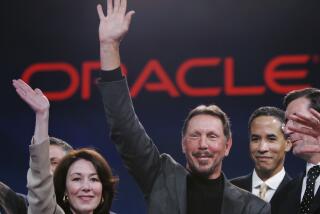Without Steve Jobs, how will Apple fare?
- Share via
In the years after Walt Disney’s death in 1966, his successors did their best to run his namesake company as they thought the founder would have wanted.
Even small decisions were subjected to extensive debate about Disney’s preferences. The effort was heartfelt and well-intentioned — and it hobbled the company.
“They were always double-checking themselves with ‘what would Walt have done?’” said Harold Vogel, a veteran Disney analyst. “It didn’t allow them to react to changes in marketplace nearly as fast as they should have.”
As Apple Inc. embarks on a future without Steve Jobs as chief executive, the technology giant can only hope it doesn’t follow in the footsteps of the many companies that suffered after their iconic leaders stepped down.
A host of prominent companies including Starbucks Corp. and Microsoft Corp. endured various stumbles after their luminary CEOs gave up the reins, analysts say. Apple itself floundered after Jobs exited in a 1985 power struggle before returning to rescue the technology giant 11 years later.
Even long-planned transitions to hand-picked successors often don’t work out, experts say.
“There are examples of charismatic and entrepreneurial founders who have passed the reins successfully, but they are much fewer and farther between than what we mostly see, which is a founder exits and the company falters,” said Nancy Koehn, a historian at Harvard Business School.
Apple has stage-managed the transition to new CEO Tim Cook as well as it could, and it has a big advantage with Jobs staying as chairman, analysts say.
And whenever Jobs departs permanently, they say, his absence probably won’t be felt for several years as the company executes the business strategy that he left.
But the longer-term track record at other companies isn’t encouraging, analysts say. It’s particularly weak at tech companies, which are vulnerable to the loss of a founder’s creative instincts in a constantly changing industry.
“Succession failures are more common in high-tech because the dynamic nature of the market and the intense competition requires constant innovation,” said Arvind Malhotra, an associate professor at the University of North Carolina Kenan-Flagler Business School.
CEO transitions are normally beset by obstacles — only some of which stem from the obvious difficulty of replacing a corporate version of Babe Ruth.
Successors typically are hesitant to deviate from an ingrained strategy, partly because they question themselves and partly because of the inevitable second-guessing from corporate boards, investors and employees, experts say.
“In some ways, the worst job for a CEO is to follow a Walt Disney or a Steve Jobs because it’s almost impossible,” said Ed Lawler, director of the Center for Effective Organizations at USC’s Marshall School of Business. “Often these people are iconic because they’re irreplaceable.”
Microsoft’s stock price, for example, has stagnated for a decade as the software behemoth has struggled with limited success to push into new markets.
Experts say that’s not entirely the fault of Steve Ballmer, who succeeded his longtime friend and colleague Bill Gates as CEO in 2000. The dot-com meltdown struck two months after his promotion, and some analysts say Microsoft’s problems were becoming glaringly apparent during Gates’ tenure. But critics say Ballmer lacks the vision and instincts of his predecessor.
When Howard Schultz, the legendary chief executive of Starbucks, stepped down in 2000, he thought he was leaving the company in capable hands. But an alarming drop in profits and stock value prompted Schultz’s return eight years later.
Walt Disney Co. benefited from the 1971 opening of Disney World in Florida, which was planned before the founder’s death, Vogel said. But it sputtered through the rest of the decade until Michael Eisner ushered in a resurgence after taking over as CEO in 1984.
So far, the reaction on Wall Street to the management change at Apple appears to be somewhat favorable. The stock, considered one of the hottest on Wall Street, fell 0.7% to $373.72 on Thursday. Most analysts felt that investors had already factored Jobs’ eventual departure into the stock price.
Investors were also comforted by Cook’s pronouncement in a letter to Apple employees that he plans to “stay true” to the company’s long-standing strategy. The letter provided soothing words during a tumultuous period, though investors and customers will be waiting to see whether Apple can remain innovative in the long term without Jobs at the helm.
“Steve built a company and culture that is unlike any other in the world and we are going to stay true to that — it is in our DNA,” Cook wrote.
More to Read
Inside the business of entertainment
The Wide Shot brings you news, analysis and insights on everything from streaming wars to production — and what it all means for the future.
You may occasionally receive promotional content from the Los Angeles Times.










